|

|
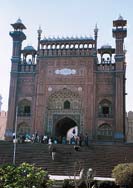
The Badshani Mosque, Lahore, Pakistan
|
SALEC is Official
GW Law School, with institutions in South Asia, has pioneered a regional forum in which the challenges and aspirations of more than one billion people can be examined and analyzed. The South Asia Legal Education Consortium (SALEC), the world’s first consortium of law schools from the United States and the Indian subcontinent, became official in February. GW Law helped create the new consortium to encourage greater political and economic integration, religious tolerance, and legal development in the region.
“SALEC views South Asia as a strategic crossroad,” says Professor Raj Bhala, associate dean for International and Comparative Legal Studies, and GW’s SALEC director. “Our ambition is to help ensure that in the next half-century South Asia takes the road toward a legal future that is far better than the legal history of the 50 years following the 1947 Partition.”
SALEC includes top law schools in India, Pakistan, Bangladesh, and Sri Lanka. Current members include GW, the Pakistan College of Law, University of Delhi, University of Calcutta, University of Kerala, University of Dhaka, Rajshahi University, and the University of Colombo. Each law school will support and sponsor academic conferences, faculty exchanges, scholarly collaboration, research opportunities for students, and the promotion of graduate legal studies programs.
SALEC enhances GW’s strong international and comparative law program that includes other initiatives, such as the Oxford-GW Summer Program in International Human Rights Law and membership in the North American Consortium on Legal Education, which facilitates student and faculty exchange among member NAFTA country schools.
Kabul Law Faculty Dean Visits GW
|

Hoquqmal talks with GW faculty members.
|
On April 24, the Law School welcomed the Dean of the Kabul Law Faculty, Professor Mahboba Hoquqmal. Professor Hoquqmal is also vice-chair of the Afghanistan’s Emergency Loya Jirga Commission.
In the 1970s, the Law School played an important role in educating Afghan attorneys by offering specialized courses and training. Professor Quadir Amiryar, BA ’96, is the GW Professor of Public International Law in the Department of Political Science and executive director of GW’s Central Asia Research and Development Center. Amiryar assisted in drafting Afghanistan’s 1964 Constitution. He was selected to participate in the 2001 U.N. Peace Conference in Bonn, Germany, which established a plan for Afghanistan’s political future based on an interim administration, transitional government, and the government after election.
At the April 24 meeting, which was attended by Dean Young and Professors Mary Cheh, Raj Bhala, Sean Murphy, and Ralph Steinhardt, and by officials of GW’s Elliott School of International Affairs, including Ambassador Karl Inderfurth and Professor Amiryar, Hoquqmal discussed rebuilding the Kabul Law Faculty. Given GW’s past involvement with Afghan lawyers and the broad reach of the GW faculty, the Law School is expected to play a pivotal role in the Afghan legal community in the future.
Buergenthal Addresses Faculty and Students
|
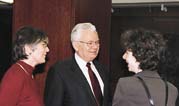
Buergenthal chats with Assistant Dean Susan Karamanian and Professor Naomi Cahn.
|
GW’s Lobingier Professor Emeritus, the Hon. Thomas Buergenthal of the International Court of Justice, returned to the Law School to address the faculty and the foreign LLM students. The informal tea in the new Faculty Conference Center gave the students a chance to ask Judge Buergenthal general questions about the Court and to focus on specific issues relating to international law. Over the past few years, the ICJ’s docket has increased. The Court is conducting more public hearings and issuing more decisions. Some of its recent decisions directly impact the administration of justice in the member nation-states. In addition to exploring these substantive legal issues, the students learned about the possibility of clerkships at the ICJ, which the United Nations is exploring.
Thai Scholars Visit GW Law
Leading scholars from Thammasat University in Bangkok, Thailand, visited the Law School this past fall to learn more about U.S. environmental law. Watcharee Limanon, LLM ’99, a Thai native who specializes in environmental law, introduced the Thammasat officials to GW, and in particular to her mentor, GW Professor Arnold Reitze. Watcharee and the U.S.-Asia Environmental Partnership made the three-day visit possible. The delegation met with senior officials from the EPA and the Department of Justice as well as representatives of the NGO community, and it had briefing sessions with Professors Reitze, Joshua Schwartz, Shi-Ling Hsu, and Jonathan Weiss. The Thai visitors were also treated to a welcoming lunch hosted by GW’s international law faculty.
As a follow-up to the visit, Reitze spoke in Bangkok in December at a conference on Administrative Law and Environmental Protection. Reitze also visited professors at Thammasat University to discuss further collaborative efforts. Reitze’s visit came shortly after Schwartz’s visit to Thailand in which he advised Thai officials on administrative aspects of environmental law.
GW Law Visits PEMEX
|
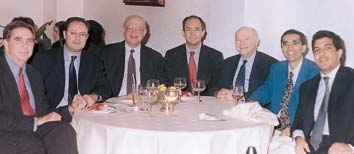
At dinner following the PEMEX conference (left to right): Dean Michael K. Young; Eduardo Nuñez, LLM '01, of PEMEX; Professor Andy Spanogle; Fernando Rosenzweig of PEMEX; Professor Fred Lees, Associate Dean Raj Bhala; and Xavier Antonio de la Garza of PEMEX.
|
Eduardo Nunez, LLM ’01, helped organize a one-day international law conference at the headquarters of Petroleos Mexicanos (PEMEX) in Mexico City. Dean Young and Professors Raj Bhala, Andy Spanogle, and Fred Lees were the featured speakers.
PEMEX executives and lawyers attended the conference, which focused on international commercial law in the Americas. Dean Young provided the opening remarks followed by Professor Bhala’s lively talk on international trade law. Spanogle then presented an enlightened view of international e-commerce, and Lees gave a thorough review of comparative government procurement law, which is of great importance to PEMEX given that it is a state-sponsored entity. PEMEX and Nunez greeted the GW faculty with the warm hospitality that is typical of our Mexican friends. The day concluded with a conference dinner, which gave the participants the chance to socialize and to learn more about their respective countries and institutions.
Hispanic Student Association Places Third in Moot Court
The Law School’s Hispanic Law Students Association earned a third place award in its debut at the Hispanic National Bar Association’s Moot Court Competition in Chicago in March.
Thirty-one of the nation’s top law schools competed in the HNBA’s seventh annual competition, which aims to promote mastery of oral and written skills and to provide an opportunity for Hispanic law students from across the country to gather in an educational environment.
Professor Lorri Unumb, director of GW’s Legal Research and Writing Program, coached the Law School team, comprised of students Miriam Valoy and Jose Rivas. Valoy won the award for third best oralist out of 82 participants.
The Hispanic Law Students Association provides support and educational services to Hispanic and other students at the Law School while fostering an appreciation for Hispanic language and culture.
In Brief
Recent Lectures, Panel Discussions, and Symposia held at gw law school
Nancy Paterson, former prosecutor of the Interna-tional Criminal Tribunal for the Former Yugoslovia, presented “Bringing War Criminals to Justice.”
“Financial Aspects of September 11th” was presented, with visiting Professor Cynthia Lichtenstein and Kara Tan Bhala.
Professor Hilary Charlesworth of the Australian National University delivered “The Hidden Gender in International Law.”
The Eighth Annual International Law and Religion Symposium focused on “The Role of the International Religious Freedom in U.S. Foreign Policy.” Dean Michael K. Young, who is chairman of the U.S. Commission on International Religious Freedom, served as one of the speakers
Professor David Caron of Boalt Hall Law School organized a mini-conference on U.S. Treaty Compliance. Participants included Professor Sean Murphy, U.S. State Department officials, and others.
Hon. Gabriel Bach, former judge of the Israeli Supreme Court, delivered “The Rule of Law in Times of Crisis.”
GW Law organized an “Opportunities in Public and Private International Law” seminar. Speakers included William Shawn, BA ’70, JD ’73, of global law firm ShawnCoulson, Martina Vandenberg of Human Rights Watch, Mark Fittipaldi of USAID, Alejandro Escobar of the World Bank’s International Centre for Settlement of Investment Disputes, and Kristine Kassekert, JD ’01, of Coudert Brothers.
“The Detainees at Guantanamo Bay: Their Legal Status and Future” was held with Professor Michael Glennon, U.C. Davis School of Law; Ken Hurwitz, International Human Rights Law Group; and Michael Matheson, U.S. Institute of Peace.
GW Fulbright Visiting Scholar Dr. Ruslan Myrzalimov of Krygyzstan delivered “The Judicial System of the Kyrgyz Republic.” Also, GW Fulbright Visiting Scholar Dr. Joanna Ching of Taiwan’s Ministry of Justice presented “Reforming Cyberlaw in Taiwan.”
“The Special Court in Sierra Leone,” was held with Hon. Joseph Melrose Jr. (former U.S. ambassador to Sierra Leone), Peggy Hicks of the International Human Rights Law Group, and Giogia Tortora of the Sierra Leone Mission to the U.N.
“Prosecuting International Outlaws: Legal Issues Concerning Universal Jurisdiction” was held with Mary Catherine Malin of the U.S. Department of State; Christopher Borgen of the American Society of International Law; Julian Ku of Debevoise & Plimpton; and Professor Ruth Wedgwood of the Paul H. Nitze School of Advanced International Studies.
Chinese law professors participated in an afternoon symposium on clinical education in the United States with GW Professor Jenny Lyman and Professor J.L. Pottenger Jr. of the Yale Law School.
Faculty News
Marty Adelman delivered lectures in Paris, Tokyo, and Taipei on biotechnology and intellectual property and industry/university collaboration.
Alberto Benitez will be teaching this summer at the Instituto Tecnológico Autónomo de México (ITAM) in Mexico City.
Raj Bhala’s “WTO Case Review 2000” appeared in Arizona J. Int’l. & Comp. L. (2001). Bhala will be delivering the inaugural Shihata Distinguished Lecture at the British Institute of International and Comparative Law in London in honor of the World Bank’s former general counsel, Ibrahim Shihata.
Karen Brown’s article titled, “Missing Africa: Should U.S. International Tax Rules Accomodate Investment in Developing Countries?” has appeared in 23 University of Pennsylvania Journal of International Economic Law 45 (2002).
Mary Cheh is participating in a conference in Neum, Bosnia-Herzegovina titled, "The Investigation, Coordination and Prosecution of Crimes of Fraud, Corruption and Transnational Crime" held the week of May 12 and sponsored by the George C. Marshall European Center for Security Studies and the U.N. Office of High Representative (OHR) Bosnia and Herzegovina.
Bob Cottrol’s “The Long Lingering Shadow: Law, Liberalism, and Cultures of Racial Hierarchy and Identity in the Americas” appeared at 76 Tulane L. Rev. 11 (2001).
Susan Karamanian was named a trustee of the Center for American and International Law and a Counsellor of the American Society of International Law. She wrote “The Road to the Tribunal and Beyond: International Commercial Arbitration and United States Courts,” 34 George Washington Int’l L. Rev. 17 (2002).
Greg Maggs will be serving as co-reporter on e-commerce for the XVIth International Congress of Comparative Law to be held this summer in Brisbane, Australia.
Sean Murphy traveled to Beijing, Shanghai, and Nanjing, China, to discuss issues of intervention and sovereignty with Chinese academics, government officials, and communist party officials. He also spoke at McGill University on how international law “binds” state and nonstate actors.
Bob Peroni co-published “Fairness in International Taxation: The Ability-to-Pay Case for Taxing Worldwide Income,” at 5 Florida Tax R. (2001) and “The Proper Approach to Taxing the Income of Foreign Controlled Corporations,” at 26 Brook J. Int’l. L. 579 (2001).
Peter Raven-Hansen wrote “Bringing Terrorists to Justice Under the Rule of Law” for the State Department and recently co-edited the third edition of National Security Law, which will include new chapters on counter-terrorism law.
Steve Saltzburg was named to the ABA President’s Task Force to advise the ABA regarding possible governmental actions in response to Sept. 11. Saltzburg also will be in China this summer as part of a group of legal professors advising on China's evidence code and the education of Chinese judges.
Steve Schooner participated as a plenary speaker at a government procurement conference at Nottingham University. Professor Joshua Schwartz was a panelist at the conference.
Andy Spanogle co-edited International Business Transactions (2d ed.) and spoke on e-commerce at the U.S.-Mexico Law Institute in Guanajuato, Mexico.
Ralph Steinhardt presented “Globalization and Human Rights” at a symposium at Boston College held in honor of GW Visiting Professor Cynthia Lichtenstein, and led a colloquium at the U.S. Institute of Peace on international humanitarian law. He also participated as panelist on the topic of “Plaintiff’s Diplomacy” at the 2002 Annual Meeting of the American Society of International Law.
Jonathan Weiss will be traveling to Kazakhstan (Almaty), Uzbekistan (Tashkent, Samarkand) and Turkey (Ankara, Istanbul) this summer as part of a State Department project. He will be keynoting regional summits and helping to advise government officials on sustainable development.
GW Law in Japan
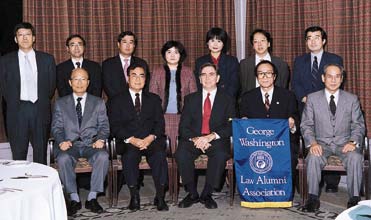 |
Dean Young Visits Japan
Dean Young visited with alumni in Tokyo, Japan, this past fall. Pictured here are: Back row, from left: Kaoru Ozawa, M Comp Law ’89, section manager, Hitachi; Takashi Ogura, M Comp Law ’89, manager, Taisei Corp.; Akira Kawabe, M Comp Law ’88, deputy head legal department, Nikko Cordial Corp.; Professor Rieko Nishikawa; Keiko Imazato, LLM ’94; Seiji Ohno, LLM ’95, attorney, Ohno & Partners; Yukio Himuro, M Comp Law ’86, general manager, NHK Enterprises 21 Inc. Front row, from left: Nobuyuki Konaka, attorney, Konaka Toyama & Hosoya; Yasuhiro Hagihara, M Comp Law ’68, partner with Squire, Sanders & Dempsey; Dean Michael K. Young; Junichi Machida, M Comp Law ’68, mayor of Sayama, Japan; Nagatomo Yamaoka, M Comp Law ’75, professor, Nihon University.
|
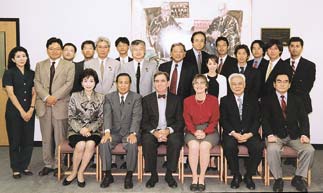 |
Japan Councilors
GW Visiting Scholar Honorable Kiichi Hiraide arranged a visit by a delegation from the Japanese House of Councilors. Also pictured are GW LLM students from Japan.
|
Back to top | April 2002 Table of Contents
Trade in the Land of Tagore
BY Raj Bhala
Associate Dean for International and Comparative Legal Studies
Patricia Roberts Harris Research Professor
|
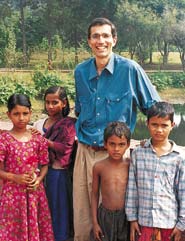
Raj Bhala with some new friends near Dhaka, Bangladesh
|
The Land of Rabindranath Tagore, the Nobel-prize winning Bengali poet, is the focus of a dispute about international trade in textiles. While in Bangladesh in December 2001 during the Muslim holy month of Ramadan, I learned about it—and a lot more. The trip to the world’s third largest Islamic country (after Indonesia and Pakistan), and eighth most populous country, occurred under the South Asia Legal Education Consortium (“SALEC”). The trip was made possible through the support of Dean Michael K. Young; our alumnus and friend Joe Brand, JD ’63, of Patton Boggs; and Bangladeshi alumnus and SJD candidate Zakir Hafez, LLM ’00.
To paraphrase another well-known poet of the Imperial Era, I could say the voyage was part of the teacher’s burden—to educate others about the civilized conduct of trade relations. Indeed, I gave five two-hour lectures in 10 days on topics like “Challenges Facing the Multilateral Trading System” and “Theological Categories for Special and Differential Treatment.” Two presentations were at SALEC-member law schools—the University of Dhaka, and Rajshahi University. The other three talks were at private business schools—the International University, the Asian University, and the Independent University of Business, Agriculture, and Technology. But, to observe the faces of students and faculty, and to hear their questions, was to realize how much I was learning from my hosts.
And, what hosts they were! Sumptuous iftar buffets to break the Ramadan fast followed thought-provoking, non-polemical questions. The images I had of East Pakistan declaring independence in 1971 and suffering roughly two million war casualties, of a country declared a “basket case” by Secretary Kissinger, and of a part of the Indian Subcontinent seasonally devastated by cyclones, soon faded. Sunny realities replaced them: smiling greetings, colorful flower bouquets, and spicy food. Gentle realities also replaced them. After Mass, I watched priests ready the choir for Christmas. I saw nuns of Mother Teresa’s order team up with my friend, Rob Robinson, a hotel manager, to treat orphans to a holiday meal. I attended Friday prayers in a rural mosque, where the mullah spoke against violence. Here were blessings by example, surely more valuable than what I could offer.
But, offer I had to, and the textile dispute was what I could deal in. Ready-made garments (“RMGs”) are a key sector in Bangladesh’s economy. About two million workers, 80 percent of whom are women, mass-produce apparel for domestic and overseas markets. RMGs account for 75 percent of Bangladesh’s exports (though only 25 percent of foreign exchange earnings, meaning RMGs are not a high-value added product). These workers and their bosses are pressed by cross-border competition not only from China and India, but also from Cambodia, Sri Lanka, and some Persian Gulf countries. On average, for one dozen shirts, wholesale importers from the EU used to pay Bangladeshi RMG exporters U.S. $5.50. Given the heightened competition, the wholesale price offered by EU buyers has fallen to $3.50. Consequently, about 60 percent of the RMG mass-production facilities barely break even, and many have closed. Some unemployed workers turn to prostitution or narcotics trafficking.
In hour-long meetings with the ministers of Commerce, Justice, and Agriculture, and the President of the Bangladesh Garment Manufacturers and Exporters Association, I discussed some ways RMG producers respond to the steep decline in world market prices. First, they contain labor costs against pressures from foreign union representatives, and stave off unionization. The result is wage suppression or depression, and only about 10 percent of the roughly 3,000 RMG factories pay good wages. The owners also minimize costs by other means, such as extending work hours, hiring younger (hence cheaper) workers, and imposing frugality on working conditions (e.g., limited lighting, ventilation, sanitation, on-premises health care stations, training programs, health and safety devices like smoke detectors, fire extinguishers, and fire escapes).
The second strategy is to search for markets overseas. Bangladeshi RMG manufacturers and exporters benefit from quotas enshrined in the Multi-Fibre Agreement. These quotas ensure a certain volume of exports to the United States (and other major markets). However, with the final elimination of quotas mandated by the WTO Agreement on Textiles and Clothing by Dec. 31, 2004, global free trade in the textile sector (absent remedial actions) is ineluctable. Bangladesh’s RMG capitalists worry how they can compete absent a country-specific, garment-specific quota system. At least, they say, give them duty-free access to the American market. After all, every WTO Member that qualifies as a least-developed country receives duty-free treatment for its RMG exports to the United States—save for Bangladesh. Thus, Bangladesh is lobbying the American government for parity with the poorest of the poor.
Should the United States agree? American textile producers say “no.” Addressing this dispute is part of my article “Poverty, Islam, and Doha,” in The International Lawyer (vol. 36, spring 2002). For now, consider two contextual points. First, like Pakistan, Bangladesh has had—and currently has—a woman elected democratically as its leader. Indeed, even more so than Pakistan, Bangladesh is run by reformists, not extremists. Second, like Pakistan, though of less strategic importance in the war on terrorism, Bangladesh quickly pledged support for America’s efforts. It, too, was a victim of 9/11. Among the World Trade Center victims were Bangladeshis, some of whom apparently served in the famous Windows on the World restaurant.
Yet, what I offered in Bangladesh on the RMG dispute was outweighed by what my hosts provided. Surely we have encountered poor people who give their all to honor us. We feel embarrassed by richness in spirit in an environment infamous for material deprivation, and we are reminded of what is lacking at home. For me, in the Land of Tagore, the training of the intellect was far less meaningful than the education of the heart.
|